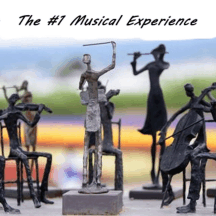
The #1 Musical Experience
The #1 Musical Experience
ratings:
Length:
130 episodes
Language:
English
Format:
Podcast
Description
Works of classical repertoire often exhibit complexity in their use of orchestration, counterpoint, harmony, musical development, rhythm, phrasing, texture, and form. Whereas most popular styles are usually written in song form, classical music is noted for its development of highly sophisticated instrumental musical forms, like the concerto, symphony and sonata. Classical music is also noted for its use of sophisticated vocal/instrumental forms, such as opera. In opera, vocal soloists and choirs perform staged dramatic works with an orchestra providing accompaniment.Longer instrumental works are often divided into self-contained pieces, called movements, often with contrasting characters or moods. For instance, symphonies written during the Classical period are usually divided into four movements:( 1) An opening Allegro in sonata form, a slow movement,a minuet or scherzo (in a triple metre, such as 34), and a final Allegro.These movements can then be further broken down into a hierarchy of smaller units: first sections, then periods, and finally phrases.Performers who have studied classical music extensively are said to be "classically trained". This training may come from private lessons from instrument or voice teachers or from completion of a formal program offered by a Conservatory, college or university, such as a Bachelor of Music or Master of Music degree (which includes individual lessons from professors). In classical music, "...extensive formal music education and training, often to postgraduate [Master's degree] level" is required.Performance of classical music repertoire requires a proficiency in sight-reading and ensemble playing, harmonic principles, strong ear training (to correct and adjust pitches by ear), knowledge of performance practice (e.g., Baroque ornamentation), and a familiarity with the style/musical idiom expected for a given composer or musical work (e.g., a Brahms symphony or a Mozart concerto).The key characteristic of European classical music that distinguishes it from popular music and folk music is that the repertoire tends to be written down in musical notation, creating a musical part or score. This score typically determines details of rhythm, pitch, and, where two or more musicians (whether singers or instrumentalists) are involved, how the various parts are coordinated. The written quality of the music has enabled a high level of complexity within them: fugues, for instance, achieve a remarkable marriage of boldly distinctive melodic lines weaving in counterpoint yet creating a coherent harmonic logic.The use of written notation also preserves a record of the works and enables Classical musicians to perform music from many centuries ago.Although Classical music in the 2000s has lost most of its tradition for musical improvisation, from the Baroque era to the Romantic era, there are examples of performers who could improvise in the style of their era. In the Baroque era, organ performers would improvise preludes, keyboard performers playing harpsichord would improvise chords from the figured bass symbols beneath the bass notes of the basso continuo part and both vocal and instrumental performers would improvise musical ornaments.Johann Sebastian Bach was particularly noted for his complex improvisations. During the Classical era, the composer-performer Mozart was noted for his ability to improvise melodies in different styles. During the Classical era, some virtuoso soloists would improvise the cadenza sections of a concerto. During the Romantic era, Beethoven would improvise at the piano.classical music ,classical music news ,classicalmusicworldusic youtube ,classical music composers ,classical music radio ,music history ,classicalmusic lover ,classicalmusicblog ,classical music downloads ,classical music concerts ,classical music for babies ,classical music for studying ,classical music for kids ,classical music online ,classical music of... Get bonus content on Patreon Hosted on Acast.
Language:
English
Format:
Podcast
Episodes1 - 10 of 130 episodes
- Oct 14, 2022
- Sep 08, 2022
- Aug 15, 2022
- Aug 01, 2022
- Jul 22, 2022
- Jul 14, 2022
- Jul 12, 2022
- Jul 12, 2022
- Jul 02, 2022
- Jun 24, 2022